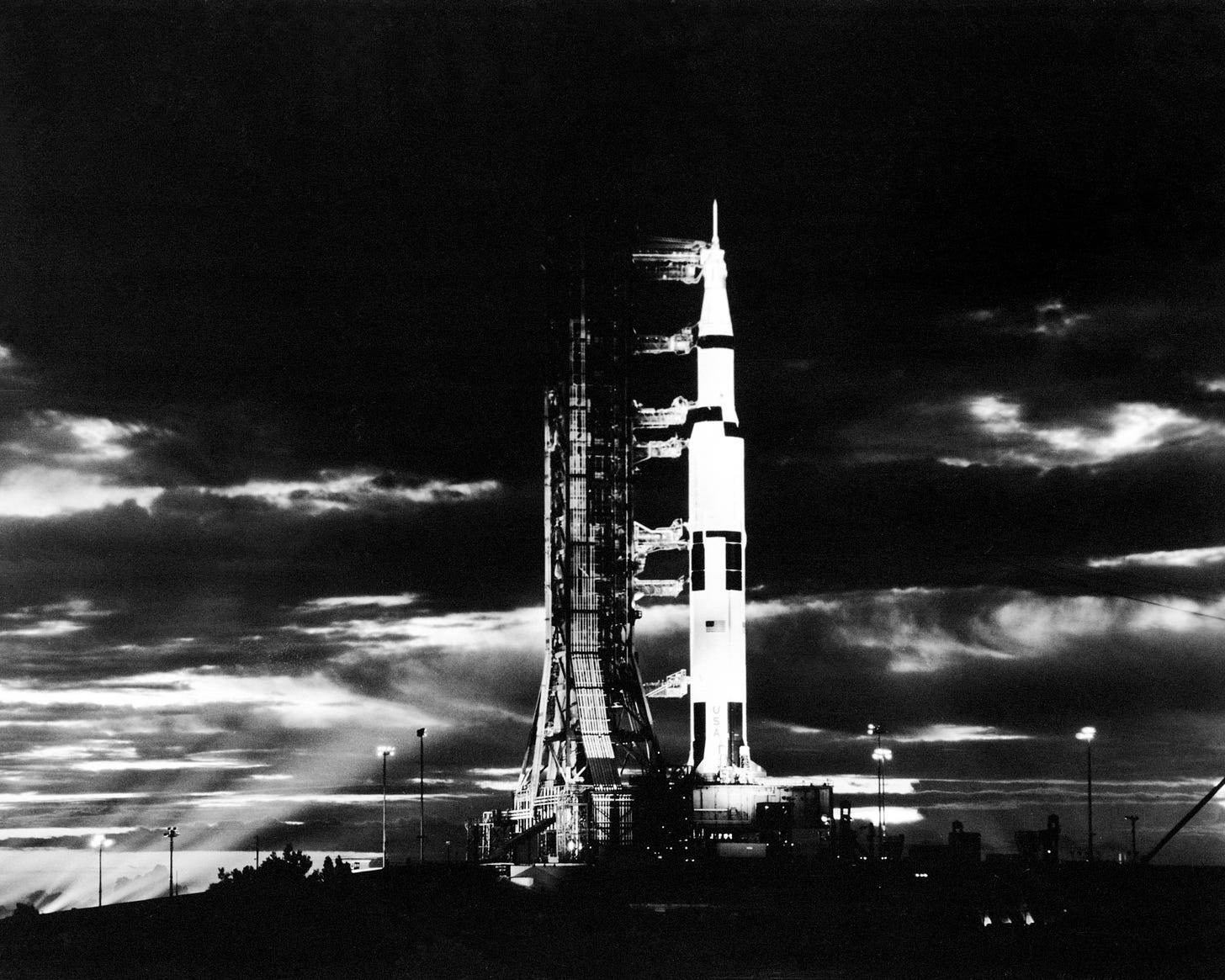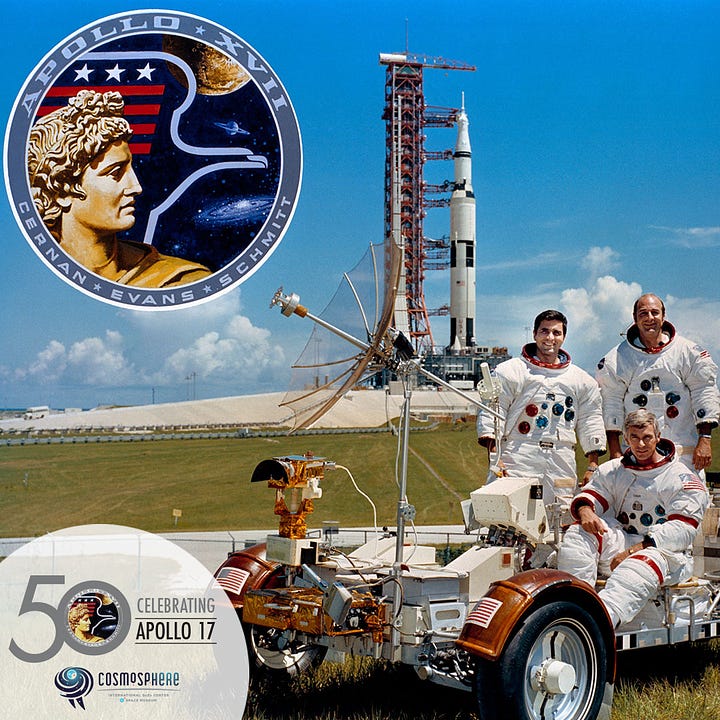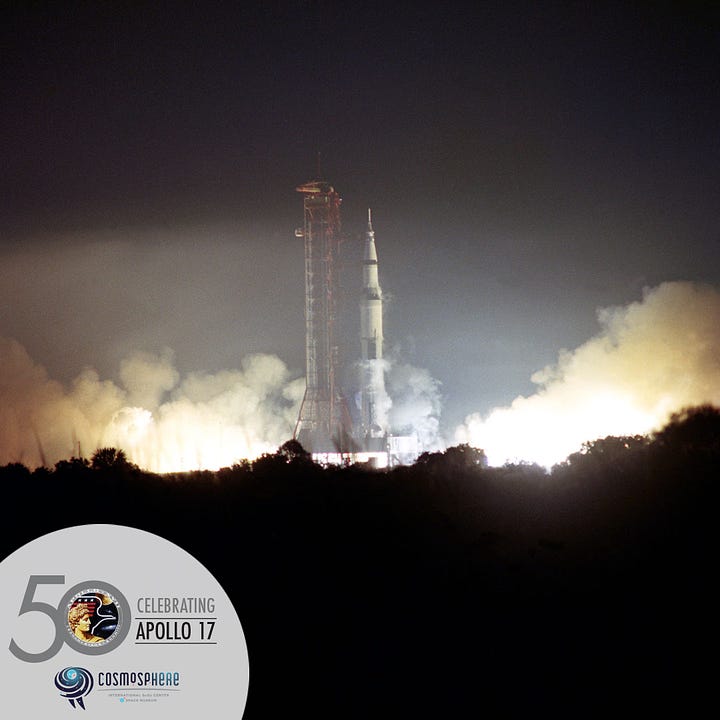Good morning! This email is coming to you from a comfy chair at a Starbucks in Liberal, KS. If you’ve never been to Liberal, they’ve got a solid aviation museum, great local restaurants, and a wonderfully hokey Wizard of Oz museum. If you’re ever passing near Liberal, take a few hours to stop and check out the town. The Liberal airport was originally an Army Air Field where aviators went to train on the B-24 bomber during World War II. Kansas was home to numerous training centers during the war where pilots trained on everything from small aircraft to the mammoth (for the time) B-29 Superfortress. Someday I’ll do a road trip and just visit these airfields. I drive through Pratt, KS, and there’s a B-29 museum located inside an Ace Hardware that I need to check out someday.
Back to space history.

“I’ve been tired of being called the end. Apollo 17 is not the end. It’s just the beginning of a whole new era in the history of mankind.”- Gene Cernan
I’m writing a series of daily posts that are viewable via the Cosmosphere’s social media accounts. The first post from yesterday celebrated the launch of Apollo 17. More posts will come over the following days, so check out the Cosmosphere’s Facebook, Instagram, or LinkedIn accounts for future posts.
I’m also working on a new podcast episode on Apollo 17, so stay tuned for details!
Here’s the post from yesterday to give you a taste of what’s to come. I’d love if you could share my publication with your friends and family. I have some big plans for 2023, and I’d love to see more people along for the ride!
At 12:33 a.m. on December 7, 1972, NASA astronauts Gene Cernan, Harrison Schmitt, and Ronald Evans began the final lunar mission of the Apollo Program. The crew lifted off from Pad 39A at Kennedy Space Center in a dramatic nighttime launch, the first and only night launch for an Apollo mission.
Pictured first in today’s post is the crew of Apollo 17 alongside the Lunar Roving Vehicle trainer and their Saturn V rocket. From left to right, Lunar Module pilot Harrison Schmitt (standing left), Command Module pilot Ronald Evans (standing right), and Commander Gene Cernan (seated in the LRV).


In an oral history interview, Cernan shared some of the remarks he made in January 1973 after the end of Apollo 17. When asked to reflect on Apollo 17, Cernan said, “I’ve been tired of being called the end. Apollo 17 is not the end. It’s just the beginning of a whole new era in the history of mankind.”
Cernan continues, “Of course at that time I said, ‘We’re not only going to go back to the Moon, we will be on our way to Mars by the turn of the century.’ That was ’73.” This oral history interview shared as part of the Johnson Space Center Oral History Project was conducted in 2007. It may have taken an extra fifteen years, but humans are finally on the way back to the Moon, and we’re going to Mars.
This past weekend the Cosmosphere hosted hundreds of spaceflight and space history enthusiasts for the First & Last Steps gala. During the gala, Harrison Schmitt discussed how scientists still acquired new knowledge from the samples recovered during Apollo 17. Fifty years may have passed since Gene Cernan, and Harrison Schmitt put their footprints on the surface of the Moon, but the legacy of Apollo 17 lives on. The Artemis missions will continue to expand our knowledge of our solar system and our place in the universe.
Sixty years ago, the Cosmosphere’s first steps were taken when founder Patty Carey set up a planetarium inside a poultry building on the grounds of the Kansas State Fairgrounds in Hutchinson, Kansas. Carey’s legacy of curiosity and learning lives on at the Cosmosphere, where we will help educate and inspire the next generation of scientists, explorers, engineers, and artists.
Join the Cosmosphere over the coming days as we celebrate the history of the people, science, and machines that made these explorations possible. We invite you to continue to join us over the next fifty years as humans write the future chapters of space exploration.
Ad astra!
Images: NASA
Post Copy: Cosmosphere Volunteer, John Mulnix, The Space Shot



